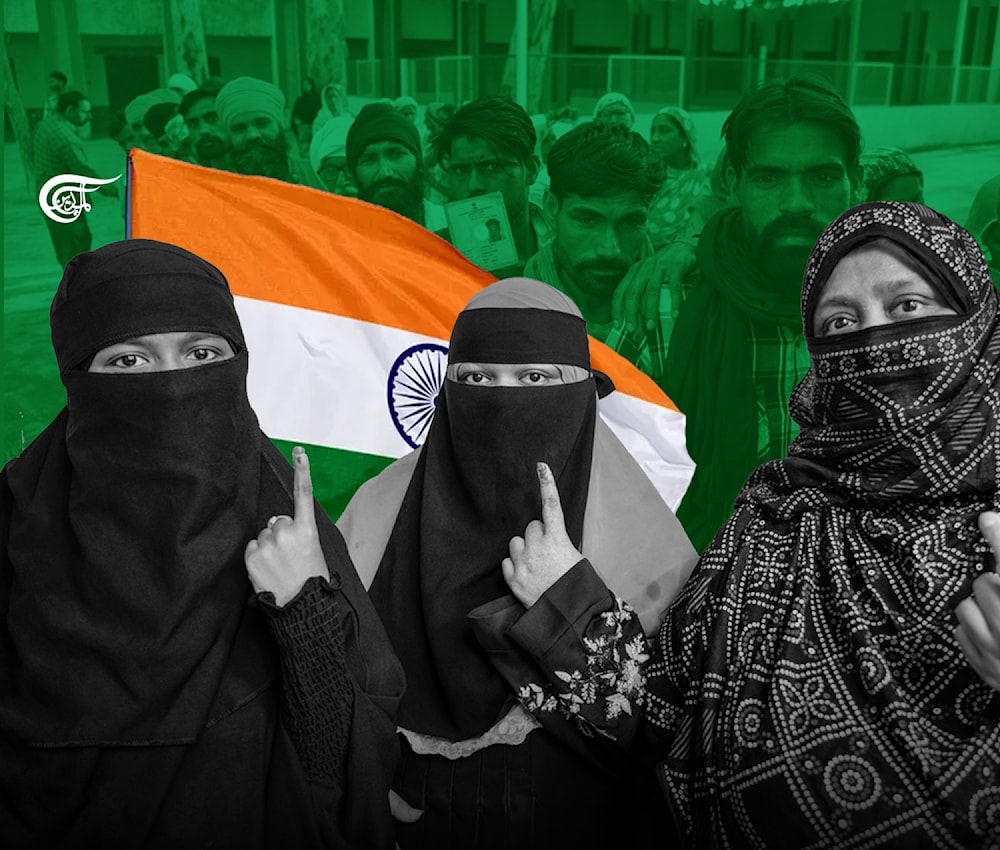Will India's Prime Minister Narendra Modi secure a third term?
Political observers believe it will be an uphill task for the Modi-led saffron party to repeat its 2014 and 2019 election performance.
-

Will India's Prime Minister Narendra Modi secure a third term? (Illustrated by Hady Dbouk to Al Mayadeen English)
India's ongoing seven-phase 18th Lok Sabha election (the Lower House of Parliament), held from April 19 to June 1, the world's largest democratic exercise, is a significant challenge for the ruling Hindu nationalist Bharatiya Janata Party (BJP) led by Prime Minister Narendra Modi. Over 969 million Indians are casting their ballots to decide whether to support Modi's BJP which considers the country a Hindu nation defined by its majority faith or the opposition INDIA bloc, a united forum of 26 opposition parties led by the main opposition Congress Party, which aims to protect the country's composite culture and secular constitution.
Notably, with the first six phases of polling in 486 parliamentary constituencies out of 543 constituencies ending on May 25 with 89.50 percent voter turnout, the last and final phase will be held on June 1.
Prime Minister Modi, who is seeking a third consecutive term as the head of the BJP-led National Democratic Alliance (NDA), faces challenges in the ongoing general elections due to domestic issues. Despite repeated accusations of corruption like the Electoral Bonds, Rafale deal, and PM Cares Fund, opinion polls conducted by pro-government media outlets show the BJP is ahead of other parties. Modi and the BJP have vowed to win the current elections with over 400 seats.
However, views on Modi's ten-year record and legacy differ among the Indian people. Political observers believe it will be an uphill task for the Modi-led saffron party to repeat its 2014 and 2019 election performance. The BJP under the leadership of Modi and his most trusted lieutenant Amit Shah (India’s Home Minister) may have strengthened political hegemony across India in the past ten years, but the common Indians are dissatisfied with Modi's unfulfilled election promises and failures on many fronts.
The BJP-led government in India has lost its invincibility due to its poor record in creating jobs and improving the rural economy. But at the end of ten years, Indian citizens found that on the economic front, Modi has not done as well as he promised. In fact, the lofty promises of the Modi-led government have fallen far short of expectations. So far, Modi's development promises, including depositing Rs 15 lakh in every individual's bank account and promising “Ache Din” (Good days) have not materialized. The government's economic initiatives, such as GST and demonetization, have made things more expensive and favored industrialists, not eliminating black money. This has also led to a deepening agrarian crisis in rural India. The farce is that in 2024, the Modi government killed 5 farmers and injured at least 40 while suppressing the farmers' “Delhi Chalo” march. Common Indians living in “non-BJP ruled states” know very well how the Modi government has been spreading lies and failing to fulfill its promises to the people.
Despite initiatives like “Make in India” and “Atmanirbhar Bharat” (Self-reliant India), India's financial condition, unemployment rate, and inflation have reached their highest levels in the last four decades. The BJP-led Centre's baseless economic decisions have led to increased inequality between the rich and the poor, with India ranking 111th out of 125 countries in the Global Hunger Index 2023 and 126th out of 143 countries in the World Happiness Report 2024.
Sensing discontent over rising unemployment and economic distress in the country, almost every electoral rally, Modi and other BJP leaders have tryed to capitalize religion to garner electoral gains, including the construction of the Ram Temple in Ajodhya, the abrogation of Article 370 in India’s sole Muslim-majority state - Jammu and Kashmir and implementing the controversial Citizenship (Amendment) Act (CAA).
Critics argue that these actions go against India's secular constitution, which emphasizes equality. The religion-based CAA, which excludes Muslims from neighboring countries' religious groups, is seen as a “success” for the BJP, potentially impacting BJP’s election prospects in the Northeast region, particularly West Bengal state.
Prominent leaders of the opposition India Alliance, including West Bengal Chief Minister Mamata Banerjee, called the arrest of the two chief ministers a “blatant assault on democracy” and reiterated their opposition to the CAA, NRC, and the Uniform Civil Code. Unfortunately, the BJP's 2024 election manifesto, known as “Modi's guarantee”, has no mention of investment in agriculture, no mention of jobs.
The far-right BJP has used communal language to appease Hindu voters, using anti-Muslim rhetoric. Modi falsely claimed that the Congress party planned to distribute wealth to Muslims, referring to over 200 million Muslims as “infiltrators” and “those who have more children” in his election campaigns. This is a deliberate attempt to do politics of religious polarization along sectarian lines, as BJP leaders seek to turn India into a distinctly Hindu state, adhering to the “Hindutva” (Hinduness) ideology. Indeed, at recent campaign rallies, Modi's anti-Muslim rhetoric has raised concerns over India's Muslim minority. It is now clear that fearing defeat in the ongoing elections, Modi and his party have resorted to communal incitement. No one has ever seen such an aggressive form of "Hindu-Muslim" polarization in Indian politics that Modi shamelessly used in this election to win the majority Hindu votes.
There is no disputing the fact that the Modi government has been using investigative agencies like CBI and ED for the last ten years, creating a “reign of terror” by arresting and imprisoning political opponents without trial in different parts of the country. Besides the cultivation of communal politics by promoting riots and violence, the arrests of Jharkhand Chief Minister Hemant Soren, Delhi Chief Minister Arvind Kejriwal, and other opposition leaders show a dictatorial mentality on the part of the Modi government in Indian democracy. Sad but true, apart from suppressing political opposition, journalists are also repeatedly threatened to do their jobs under the BJP government.
In an interview with Indian news channel NDTV on May 25, Modi said he believed God had chosen him for a purpose. But India needs democracy, not a God-sent saviour. Maybe Modi will save his fortress in the Varanasi constituency but it is a mammoth task for Modi to secure a majority in the 543-member parliament by playing his strident brand of Hindu nationalism card for his party this time. As psephologist and political commentator Yogendra Yadav recently predicted that the BJP is getting less than 250 seats.
It is very true that avoiding the country's burning issues, the Modi-led BJP brigade has been peddling religious polarization, division, and the dream of “Viksit Bharat” (developed India) by 2047 to win the 2024 elections.
However, if the BJP emerges as a frontrunner, it is to be understood that a new doctrine of populist nationalism with some kind of religious polarization is getting endorsed in India’s politics. Let’s wait for June 4, the result day which will seal the fate of Indian politics, nay, the soul of India.

 Rabi Sankar Bosu
Rabi Sankar Bosu
 7 Min Read
7 Min Read











